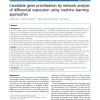Free Online Productivity Tools
i2Speak
i2Symbol
i2OCR
iTex2Img
iWeb2Print
iWeb2Shot
i2Type
iPdf2Split
iPdf2Merge
i2Bopomofo
i2Arabic
i2Style
i2Image
i2PDF
iLatex2Rtf
Sci2ools
142
click to vote
BMCBI
2010
2010
Candidate gene prioritization by network analysis of differential expression using machine learning approaches
Background: Discovering novel disease genes is still challenging for diseases for which no prior knowledge - such as known disease genes or disease-related pathways - is available. Performing genetic studies frequently results in large lists of candidate genes of which only few can be followed up for further investigation. We have recently developed a computational method for constitutional genetic disorders that identifies the most promising candidate genes by replacing prior knowledge by experimental data of differential gene expression between affected and healthy individuals. To improve the performance of our prioritization strategy, we have extended our previous work by applying different machine learning approaches that identify promising candidate genes by determining whether a gene is surrounded by highly differentially expressed genes in a functional association or protein-protein interaction network. Results: We have proposed three strategies scoring disease candidate genes ...
Related Content
| Added | 08 Dec 2010 |
| Updated | 08 Dec 2010 |
| Type | Journal |
| Year | 2010 |
| Where | BMCBI |
| Authors | Daniela Nitsch, Joana P. Gonçalves, Fabian Ojeda, Bart De Moor, Yves Moreau |
Comments (0)

